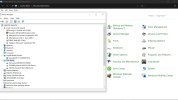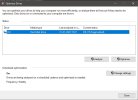If it was an SSD to begin with, its still an SSD now. Partitioning it only makes windows treat it as a separate drive but the speeds will remain more or less the same. Partitioning was resorted to mostly when we had FAT32 file systems. With NTFS, partitioning lost its steam. Or Did your laptop come with a dual drive i.e. SSD as well as HDD (i remember laptop manufacturers introduce dual drives when SSDs were still expensive).You are right.
Mine's actually an SSD drive, but got a black screen very eary on.
Lenovo fixed it remotely, but from what I remember, they made boot/os as an hdd partition.
I was relieved then to have had the problem fixed.
I think if I could redo the boot/os to ssd, my fan noise problem (mentioned in another thread) will be mitigated to a large extent.
Thing is am very reluctant to tinker now. It's just some kind of tedium i guess.
But will get to it one day. Hopefully soon.
Thanks for the insight, Czar. Actually reminded me of a real issue I need to get down to fixing.
You are using an out of date browser. It may not display this or other websites correctly.
You should upgrade or use an alternative browser.
You should upgrade or use an alternative browser.
Any Windows 10 FMs switched to 11?
- Thread starter k-pad
- Start date
amrutmhatre90
Well-Known Member
Couldn't bare with Windows 11, switched to Windows 10 back.
If you try switching back to Windows 10 within 10 days it is a seemless process. But I choose to do a clean install as wanted to declutter the OEM apps which i never used.
If you try switching back to Windows 10 within 10 days it is a seemless process. But I choose to do a clean install as wanted to declutter the OEM apps which i never used.
I don't know whether any of you used the Vista? It had the most scenic install ever amongst all versions. In fact all card games including Solitaire got animations there, plus the widgets etc and each one made its appearance at the install routine and appeared most stunning.
Most people got it pre-installed on laptops & pc and never had the chance to get amazed by this theatrical experience. An MNC making mobile phones then (now shut shop) used the Enterprise version, bereft of any games, and likeable apps and most used it like we use Portable Photoshop on pendrive edition.
Windows got many brickbats, it forgot to highlight a fact (not visible to majority as their HDD had only one partition) that "immaterial on which drive/partition you install, when running, you find yourself having C as main partition. I had six partitions and just for that fabulous install routine, installed on all six, yet even if I ran it from partition K, Windows turned it to C and ran fast. I never liked the twin Desktops, widgets and some apps but this version flawlessly connected to every hardware I attached.
Most people got it pre-installed on laptops & pc and never had the chance to get amazed by this theatrical experience. An MNC making mobile phones then (now shut shop) used the Enterprise version, bereft of any games, and likeable apps and most used it like we use Portable Photoshop on pendrive edition.
Windows got many brickbats, it forgot to highlight a fact (not visible to majority as their HDD had only one partition) that "immaterial on which drive/partition you install, when running, you find yourself having C as main partition. I had six partitions and just for that fabulous install routine, installed on all six, yet even if I ran it from partition K, Windows turned it to C and ran fast. I never liked the twin Desktops, widgets and some apps but this version flawlessly connected to every hardware I attached.
Better to wait for a few months till all the flaws In Windows 11 get noticed and ironed out. Then it would be prudent to install it. As it is there is no tearing hurry as such.
In our usage, the most stable version was Windows NT.
In our usage, the most stable version was Windows NT.
L
Could confirm if it is a dual drive, but lost those logs from when the fix was done.
It's SSD only, in that case.If it was an SSD to begin with, its still an SSD now. Partitioning it only makes windows treat it as a separate drive but the speeds will remain more or less the same. Partitioning was resorted to mostly when we had FAT32 file systems. With NTFS, partitioning lost its steam. Or Did your laptop come with a dual drive i.e. SSD as well as HDD (i remember laptop manufacturers introduce dual drives when SSDs were still expensive).
Could confirm if it is a dual drive, but lost those logs from when the fix was done.
It says the drive's HDD!You can go to control panel>device manager and check by expanding disk drives as shown below:
View attachment 66759
Attachments
Decadent_Spectre
Well-Known Member
Click on My Computer/This PC etc select Properties, you should see Device Manager on the left hand side.
Yep, checked.Click on My Computer/This PC etc select Properties, you should see Device Manager on the left hand side.
Seems it is an HDD. I might have been wrong in thinking my drive was an SSD and something went wrong when Lenovo fixed it remotely.
I have a 10 year old Lenovo that took 2 to 3 minutes to booth. I installed an SSD, and now it boots in under 12 seconds.8-second boot time is very tempting!
Have timed mine, and this bugger's a fluggish sluggish.
Booting and loading is usually slowed down by disk read/write time. Nothing to do with the OS.
I also have a new Dell XPS 13 with SSD that takes 5 seconds. For me, the Lenovo is more useful as it has all my programs and data. I can wait for 6 or 7 seconds.
Cheers
Decadent_Spectre
Well-Known Member
Yep, checked.
Seems it is an HDD. I might have been wrong in thinking my drive was an SSD and something went wrong when Lenovo fixed it remotely.
As an aside, even if if you have a SSD boot times and loading times can be slowed down by having HDDs connected to the same computer, the more HDDs you have connected the more likely it will be slow. This is compounded if your HDD is old and may have issues that may or may not show up in SMART.
Generally people recommend an SSD upgrade from a HDD over a CPU upgrade for a speed upgrade in normal applications.
I had no problems with Rift S when I initially installed Win 11. All was fine for quite some time. Then came an update which created problems. Oculus support has stated that their software is not compatible with Win 11.I got a laptop with Win 11 pre-installed and then updated my Desktop. Oculus Rift S included everything is working well for more than 2 months. No problems here.
https://forums.oculusvr.com/t5/Support/Can-t-install-Oculus-Software-on-Windows-11/td-p/894424
The thread has suggested a fix but I have already uninstalled 11 and not in a hurry to get back.
Last edited:
MIOM
Active Member
As a PC builder and enthusiast, I'm running Windows 11 Pro RTM and like it. Haven't had any itch to move back to Windows 10. It does take some getting used to - many things and settings have changed or moved. There are many complaints about the taskbar where pinning shortcuts are concerned. There's also the whole TPM confusion thing that shy's many from Windows 11 (mostly misinformation and lack of knowledge).
My custom-built machine from 2019 is fully compatible with Windows 11 (TPM, Secure Boot, CSM disabled), so no hardware issues, nor any software issues as I don't run overly old software on my systems.
Pretty much anything you can run on 10 will run on 11 (obviously older software (10 years or more) may have issues).
My custom-built machine from 2019 is fully compatible with Windows 11 (TPM, Secure Boot, CSM disabled), so no hardware issues, nor any software issues as I don't run overly old software on my systems.
Pretty much anything you can run on 10 will run on 11 (obviously older software (10 years or more) may have issues).
I had upgraded from Win 10 so oculus software was pre-installed, hence didn't fave this issue. I don't use the laptop for VR so didn't know about this at all. ThanksI had no problems with Rift S when I initially installed Win 11. All was fine for quite some time. Then came an update which created problems. Oculus support has stated that their software is not compatible with Win 11.
https://forums.oculusvr.com/t5/Support/Can-t-install-Oculus-Software-on-Windows-11/td-p/894424
The thread has suggested a fix but I have already uninstalled 11 and not in a hurry to get back.
I have an upgraded win10->win 11 Dell laptop. It boots up in 10 secs. I find there is a slight audible difference in USB dac performance compared to windows 10 and windows 7 laptops. There is no harm in trying just get an ssd drive and transfer data and then upgrade, so you will have 2 copies if you want to go back to windows 10 on your older harddisk.
sud98
Well-Known Member
I bought a new Dell inspiron(i5), came pre-loaded with Win 11. Boots as fast as my other dell inspiron(i3), didnt see a major improvement. Both run on SSD (which makes the bug difference.
The Start menu changes take some time to get used to, and has some cool changes for accessing widgets and other windows faster. But didnt see any major differences for regular use.
The Start menu changes take some time to get used to, and has some cool changes for accessing widgets and other windows faster. But didnt see any major differences for regular use.
MIOM
Active Member
Windows 11 to seems a tad snappier than Windows 10. Anyway, outside the UI changes (many), there are also some under the hood changes many may not see or notice - mainly security and performance enhancements.I bought a new Dell inspiron(i5), came pre-loaded with Win 11. Boots as fast as my other dell inspiron(i3), didnt see a major improvement. Both run on SSD (which makes the bug difference.
The Start menu changes take some time to get used to, and has some cool changes for accessing widgets and other windows faster. But didnt see any major differences for regular use.
Anyway, I'm using Windows 11 and like is so much, I no longer have any Windows 10 machines (to include two desktops and a laptop).
Two of my laptops upgraded to Win11. I do not see any improvement from a user point of view other than few UI changes. But they are running smoothly without any issues. Also, I completely diched third party AV software since the inbuilt one is good enough. This has made the machines speedier and more smooth.
But one change I observed is the sound quality of WIn11 is better than Win10.
But one change I observed is the sound quality of WIn11 is better than Win10.
MIOM
Active Member
How? Did the "hardware" get updated?But one change I observed is the sound quality of WIn11 is better than Win10.
Purchase the NEW Audiolab 6000A MkII Integrated Amplifier at a special offer price.
Similar threads
- Replies
- 3
- Views
- 16K
- Replies
- 66
- Views
- 12K



